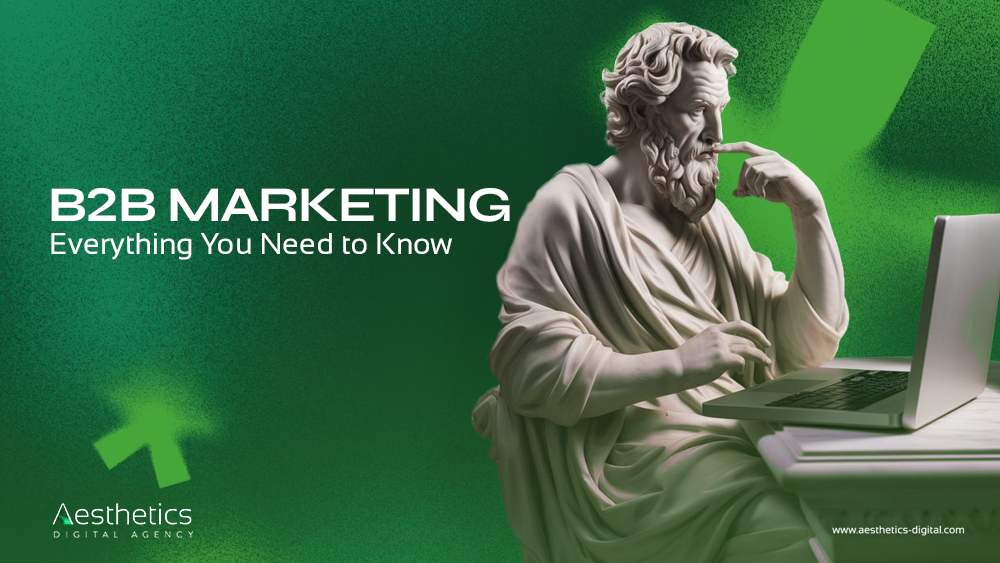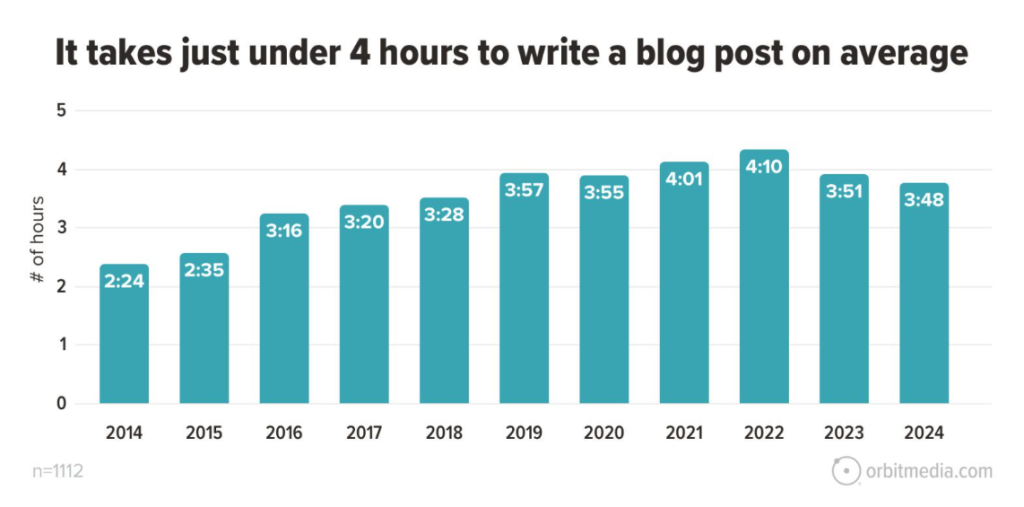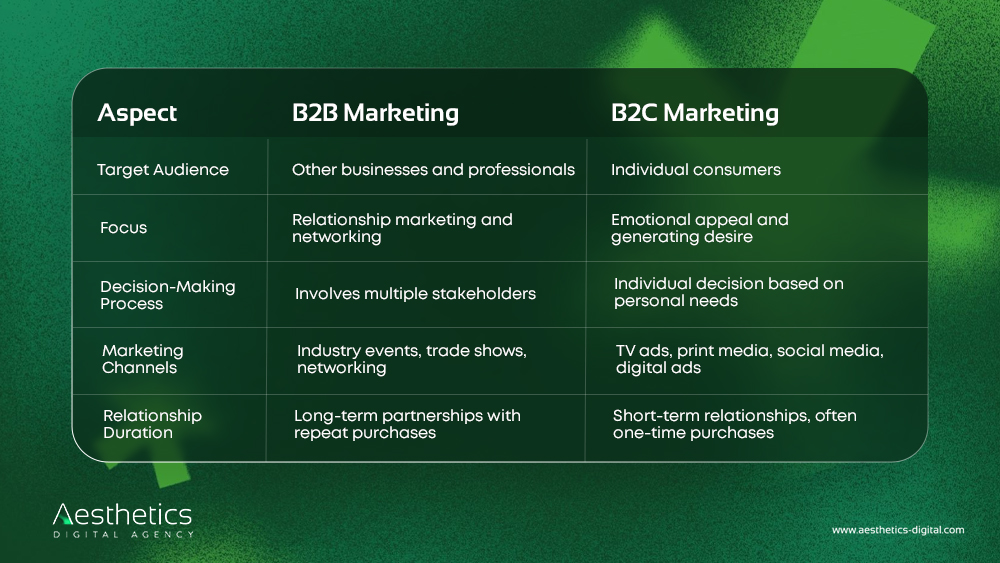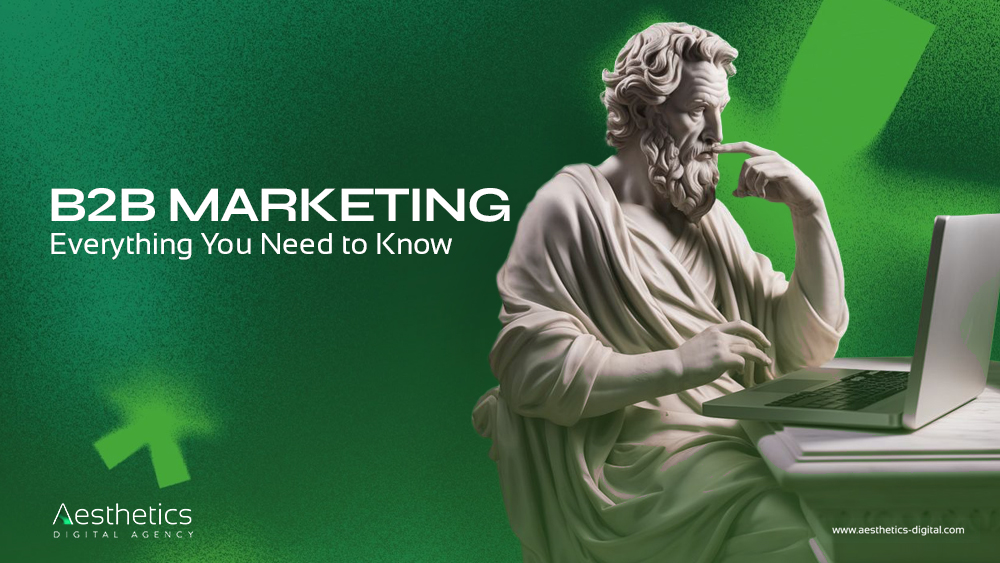
In the 2024 competitive business landscape, effective marketing strategies are essential for companies looking to stay ahead of the curve. While most people are familiar with Business-to-Consumer (B2C) marketing, the lesser-known world of Business-to-Business (B2B) marketing plays an equally significant role in driving success for many businesses.
With the B2B market growing rapidly around the world, one needs to be well acquainted with its marketing concepts and practices. US B2B e-commerce is projected to grow at a compound annual growth rate of 10.7%, reaching over three billion dollars in sales by 2027. This statistic highlights the tremendous potential that B2B marketing can have.
Our previous blog covered Branding vs Marketing; today, we will explore how B2B vs B2C marketing strategies differ.
What is B2B Marketing?
B2B marketing refers to the process of promoting and selling products or services from one business to another. As opposed to B2C Marketing which targets the general consumer, B2B Marketing entails identifying with other companies and comprehending their needs and issues.
Some of the examples of B2B transactions include; one company selling software to another company, a manufacturing company buying raw materials from a supplier, or a consulting firm outsourcing to an advertising agency.
The knowledge of the target audience is the foundation of B2B marketing. Many times, a lot of market research is needed in order to determine what the potential clients may need and what their problems may be. According to recent statistics, while the average blog post takes 3 hours and 51 minutes to write, B2B marketing efforts typically take longer due to the need for in-depth market research.

The other important feature of B2B marketing is that it mainly deals with the formation of long-term partnerships. While B2C is characterized by a one-off and short contact, B2B is a relationship between organizations, and there is always a need to trust each other. This is why B2B marketing requires the development of relationships with potential customers essential for business success.
B2B vs B2C Marketing
When it comes to marketing, one size does not fit all. Different businesses have different target audiences and therefore require different strategies for their marketing efforts. The two main types of business models are Business-to-Business (B2B) and Business-to-Consumer (B2C). While both aim to sell products or services, the approach towards their respective audiences is vastly different.
B2C marketing focuses on selling products or services directly to the end consumer. This includes all forms of advertising and promotions done to influence an individual’s purchasing decisions.

Target Audience
B2B marketing and B2C marketing differ in terms of the target market as well as in the approach used to target it. B2B marketing is marketing of products and services to other businesses and professionals, while B2C marketing targets individuals.
Target consumer is another factor that influences the marketing strategies adopted for the two products; this is because the two products attract different consumers. In the case of B2B, relationship marketing and networking are influential since the acquisition of goods is often based on trust and continuity. B2C is more reliant on the appeal to emotions and generating a want for the products and services in order to make a purchase.
Decision-making Process
The decision-making process also differs between B2B and B2C customers. In the case of B2B, multiple stakeholders are involved in making a purchase decision. This means that B2B marketing needs to cater to the specific needs and preferences of each stakeholder in order to close a deal.
Whereas, B2C customers are involved in the buying decisions due to self-need, and thus the factors such as, emotional appeal and branding are important for the business.
Marketing Channels
The channels used for marketing also vary between B2B and B2C businesses. B2B companies rely on industry events, trade shows, and networking opportunities to reach potential clients. B2C companies utilize a mix of traditional channels such as TV ads, print media, and digital platforms like social media to reach a wider audience.
Long-Term vs Short-Term Relationships
B2B vs B2C marketing also differ in the duration of their relationships with customers. B2B businesses focus on building long-term partnerships with clients. It involves repeat purchases or contracts that last for years. On the other hand, B2C companies have shorter relationships with customers as they mostly make one-time purchases.
What is B2B Video Marketing?
Business to Business video marketing is the process of making videos that will help in the promotion of products and or services within the business world. This approach has risen in popularity over the years with 88% of the B2B buyers admitting that they have watched a video for purposes of product knowledge within the last 90 days. This number stresses the need to include video to your B2B marketing mix.
There are several types of videos including, but not limited to, the training and demonstration videos, the customer stories and reviews, the leadership and perspective videos, and others. They enable you to express the personality of your brand, explain your ideas in the most effective manner and connect with your audience on an emotional level. A research by Brightcove states that 93% of B2B buyers say video is important in building trust in a brand.
There are several types of videos that can be effective in B2B marketing:
- Explainer Videos: These videos are short and give the audience a brief on your product or service and what it offers.
- Product Demos: Promotions should give a real life picture of how your product performs.
- Customer Testimonials: Satisfied clients can also be used to give their testimonies hence creating trust and credibility.
- Webinars: Webinars that can be live or pre-recorded offer more detailed information about the trends within the industry, strategies, and much more.
To maximize your B2B video marketing outcomes, it is crucial to consider the views, engagement rates, conversion rates, among others. These metrics can then be analyzed to improve the efficiency of the videos that you are putting out.
How Do I Promote My B2B Video?
Promoting B2B video content requires a strategic approach to ensure it reaches the right audience. Here are some effective strategies:
Share on Social Media
Social media platforms like LinkedIn, X, and Facebook are great for promoting your B2B videos. You can share the video on your company page or personal profile, post it in relevant groups, and use relevant hashtags to increase visibility. 82% of B2B marketers believe that LinkedIn provides the most value to their organization as a social media platform.
Include in Email Campaigns
It was earlier noted that the incorporation of videos in emails increases the click-through rate by a large margin. Be sure you use an effective email list and always use videos in your emails to the different segments. Incorporation of videos in your emails can help to boost your click through ratio by 300%.
Optimize for SEO
Similar to the text, the video content can be also made SEO friendly. When uploading your video, ensure that you incorporate keywords on the video’s title, description, and tags so that it can easily be seen on the search engine result pages.
Run Paid Ads
It is also possible to use paid ads within the social media platform to reach the intended audience and consequently gain more views on the videos. It might also be inexpensive to do, and therefore could be a good way to find people who might be interested in this product. LinkedIn is the leading B2B platform, with three-quarters of marketers using it to target business decision-makers through paid ads. Additionally, nearly 80% of these marketers report that LinkedIn ads yield the best results.
What Are the 4 Types of B2B Marketing?
Content Marketing
Content marketing deals with the tactic of developing and delivering quality, relevant, and regular content to an audience that has been well defined. Some of the most frequent content formats used in B2B marketing include white papers, e-books, blogs, webinars.
Inbound Marketing
Inbound marketing is a method of marketing that targets people who show interest in a company’s products or services through useful content. Unlike in other strategies where the business force pushes the product out, this strategy relies on attracting the customers to the product. These are search engine optimization, social media marketing, and content creation.
Outbound Marketing
Outbound marketing is less common and is a broader method of marketing where the company initiates the communication with the customer. These are cold calling, direct mailing, and advertising. Even though it may be considered less efficient than inbound marketing, if done properly it can bring even great results.
Relationship Marketing
Relationship marketing therefore focuses on creating and maintaining long term customer relationship. It refers to establishing rapport with the clients and ensuring that they are delivered similar and satisfactory experiences. This is a very important type of marketing that is crucial in ensuring that the existing clients are retained and they are encouraged to continue patronizing the business.
What are the 4 C’s of B2B Marketing?
The 4 C’s of B2B Marketing provides an effective framework to implement marketing strategies effectively. Here’s a brief explanation of this:
- Customer
An important part of B2B marketing is identifying your potential customers. It assists you to know your customers’ requirements, desires, and the challenges they face which assists in enhancing your marketing strategies. The activities of defining the marketing plan would include the following: Conducting the basic market research, feedback and developing the buyer’s personas to understand the audience better.
- Cost
B2B marketing is not the price of your products and services, but it entails several expenses. It is a combination of the concept of cost and investment, the overall value you bring to your target market. This is why it is necessary to convey the value that the client will be receiving from the business transaction so that he or she can be in a position to understand the brand value.
- Convenience
The essence that you offer to your customer is the convenience. Just the way it has been outlined in the process, the manner in which the entire buying process has been made hassle free for the customer, portrays the image of the product or the service. Businesses that experience high levels of B2B relationship with their customers benefit from this.
- Communication
This means that communication is the essence of any marketing strategy that is to be implemented. How you communicate your message and what you establish as the narrative of your brand determines future communication. The right way is to utilize such channels as email, social networks, and Webinars to reach out to the audience and share useful information.
The Benefits of B2B Marketing
B2B marketing offers numerous benefits that can drive business growth and success. Here are some key advantages:
Enhanced Brand Awareness
The B2B marketing process assists companies in achieving the desired brand image within the sector. Through the provision of useful information and establishing communication with the target audience, a brand becomes recognizable and credible. The well-known brand calls more potential consumers and creates more chances for further development.
Improved Lead Generation
B2B marketing techniques produce better quality leads as the prospects are businesses, which are likely to convert to customers. According to the marketing methods, inbound, content, and outbound all aim at capturing leads, making them informed to make a buying decision.
Increased Customer Loyalty
Building strong relationships with customers is a core objective of B2B marketing. By understanding their needs, providing exceptional value, and maintaining open communication, businesses can develop long-term loyalty. Satisfied customers are more likely to become repeat buyers and advocates for your brand.
The Importance of Personalization in B2B Marketing
Personalization is a key trend in B2B marketing, driven by the demand for relevant and specific experiences. Here are some ways to incorporate personalization into your strategy:
Segmenting Your Audience
Since B2B companies are selective in choosing their target market, you should segment your audience by industry, company size, and job titles. It enables the development of a relevant content and campaigns that will suit the needs of each segment of the market.
Example: If you offer a project management software, you can segment your audience into different industries like IT, construction, and healthcare. For the IT segment, highlight features like software integration and agile project management. For the construction segment, focus on scheduling and resource management features.
Customizing Content
Produce content that targets your audience by focusing on problems they face and difficulties they encounter. Try to use the information and knowledge you have about the client and his or her needs to adjust your communication strategy and provide relevant solutions while also showing that you care about the specific circumstances that they are in.
Example: For a cybersecurity firm, if your data shows that small businesses are particularly concerned about ransomware, you could create a blog series focused on ransomware protection specifically for small businesses, providing practical tips and case studies relevant to their size and resources.
Personalizing Communication
Use personalized communication to build stronger relationships with your customers. Address them by name, reference their previous interactions with your brand, and provide tailored recommendations. Personalization shows that you value their business and are committed to meeting their needs.
Example: When sending a follow-up email after a product demo, address the recipient by name and mention specific points discussed during the demo.
Measuring the Success of Your B2B Marketing Efforts
Measuring the success of your B2B marketing efforts is essential for continuous improvement. Here are some key metrics to track:
Lead Generation
Track the marketing leads and the number of leads that are being produced over the marketing campaign. Monitor where they come from, how good they are, and how many of them convert to the needed outcome to determine which channels and approaches are the best.
Engagement
Track the level of people’s involvement, the frequency of visits to your website, comments and shares in social networks, the number of opened e-mails, etc. High engagement shows the level of audience interest and how much they are willing to do by responding to your post.
ROI
Determine the percentage return on investments (ROI) of your marketing strategies. In this case, you should evaluate the cost of marketing and revenue to be able to understand the general efficiency of your strategies.
Why B2B Marketing Takes Longer to Write
Extensive Market Research
B2B marketing content cannot be developed in a vacuum; it is important to know what is going on in the market as well as what your competitors are doing and the needs of the consumers. This significant process is geared towards generating content that will appeal to the intended audience.
Longer Sales Cycles
B2B sales cycles are normally longer than the B2C cycles, and they are usually multistage and can involve many individuals. Marketing content has to cover all the stages of the buyer’s funnel starting from awareness and ending with a decision, which increases the time needed for content development.
Detailed and Technical Content
B2B content often includes technical details and in-depth information about products or services. Ensuring accuracy and relevance demands thorough research and careful writing, which contributes to the longer time frame.
Conclusion
B2B marketing is by no means easy, although it is very important for any organization that wants to achieve long-term success and market domination. Therefore, when you understand the fundamental concept, integrate different forms of marketing, and apply the four C’s, you would be able to develop a sound B2B marketing approach.
Remember, the key to success lies in continuous learning and adaptation. B2B marketing is always evolving, and staying ahead of the curve will ensure your business remains relevant and successful.







